Wheel Drive Shaft Inner Joint and Boot Replacement GKN
Tools Required
| • | J 8059
Snap Ring Pliers (Parallel Jaw) |
| • | J 35910
Drive Axle Seal Clamp Pliers |
| • | J 41048
Drive Axle Swage Ring Clamp |
Removal Procedure
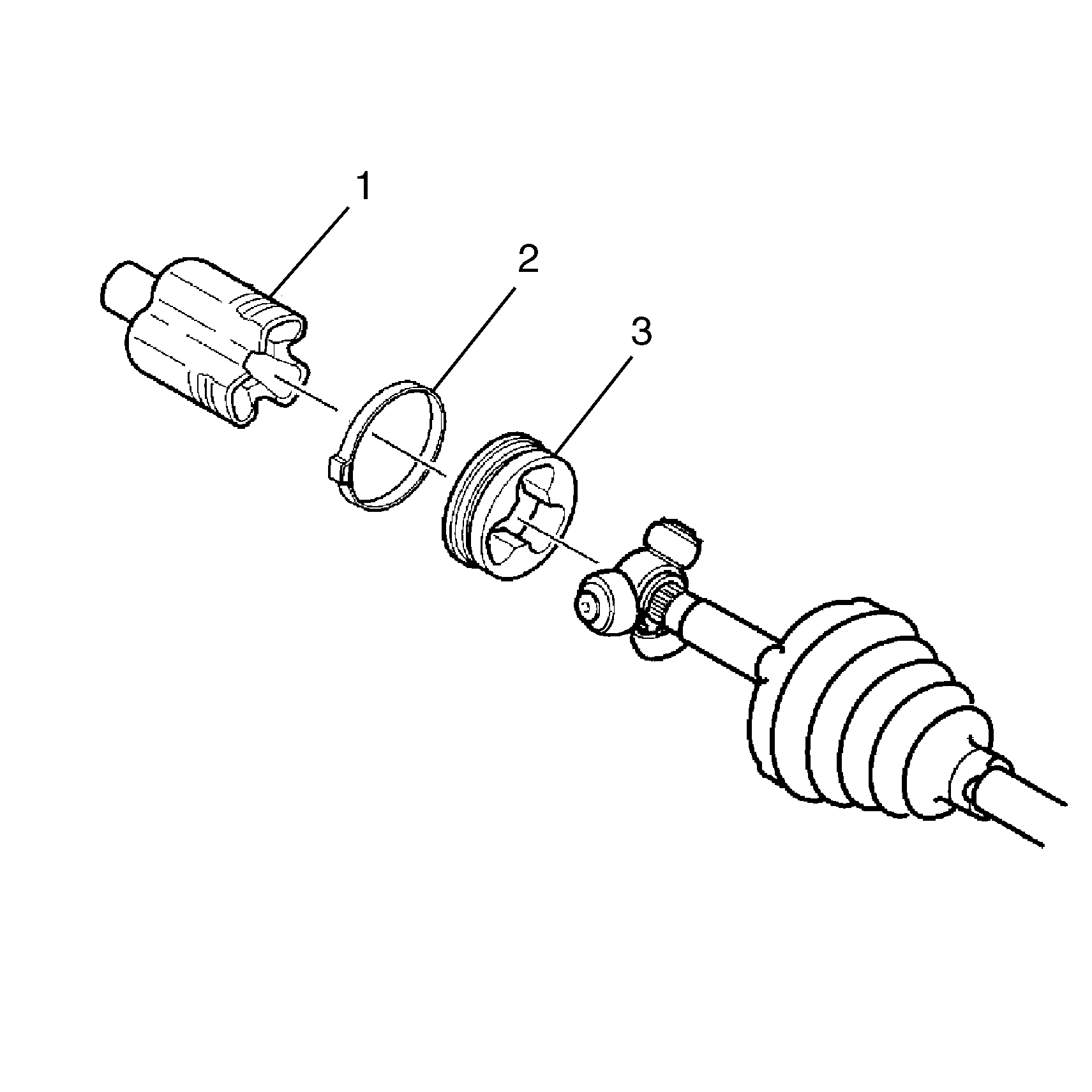
Notice: Do not cut through the wheel drive shaft inboard or outboard boot during service. Cutting through the boot may damage the sealing surface of the housing and the tripot or the constant velocity joint bushing. Damage
to the sealing surface may lead to water and dirt intrusion and premature wear of the constant velocity joint.
- Disconnect the swage ring from the shaft using a hand grinder to cut through the ring, taking care not to damage the shaft.
- Remove the large seal retaining clamp (2) from the tripot joint with side cutters. Discard the large seal retaining clamp.
- Separate the inboard seal from the trilobal tripot bushing (3) at the large diameter.
- Slide the seal away from the joint along the shaft.
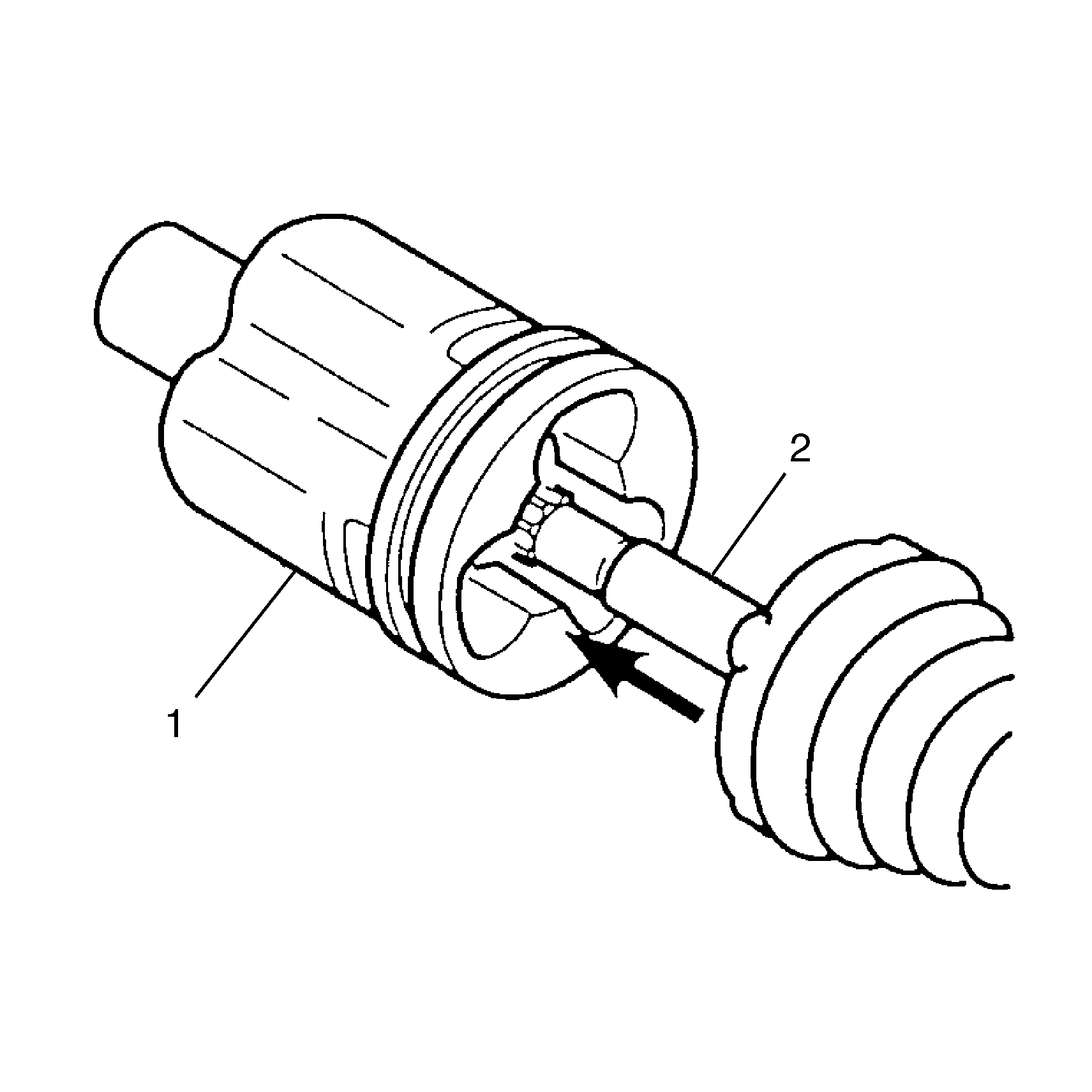
- Remove the housing (1) from the tripot joint spider and the shaft (2).
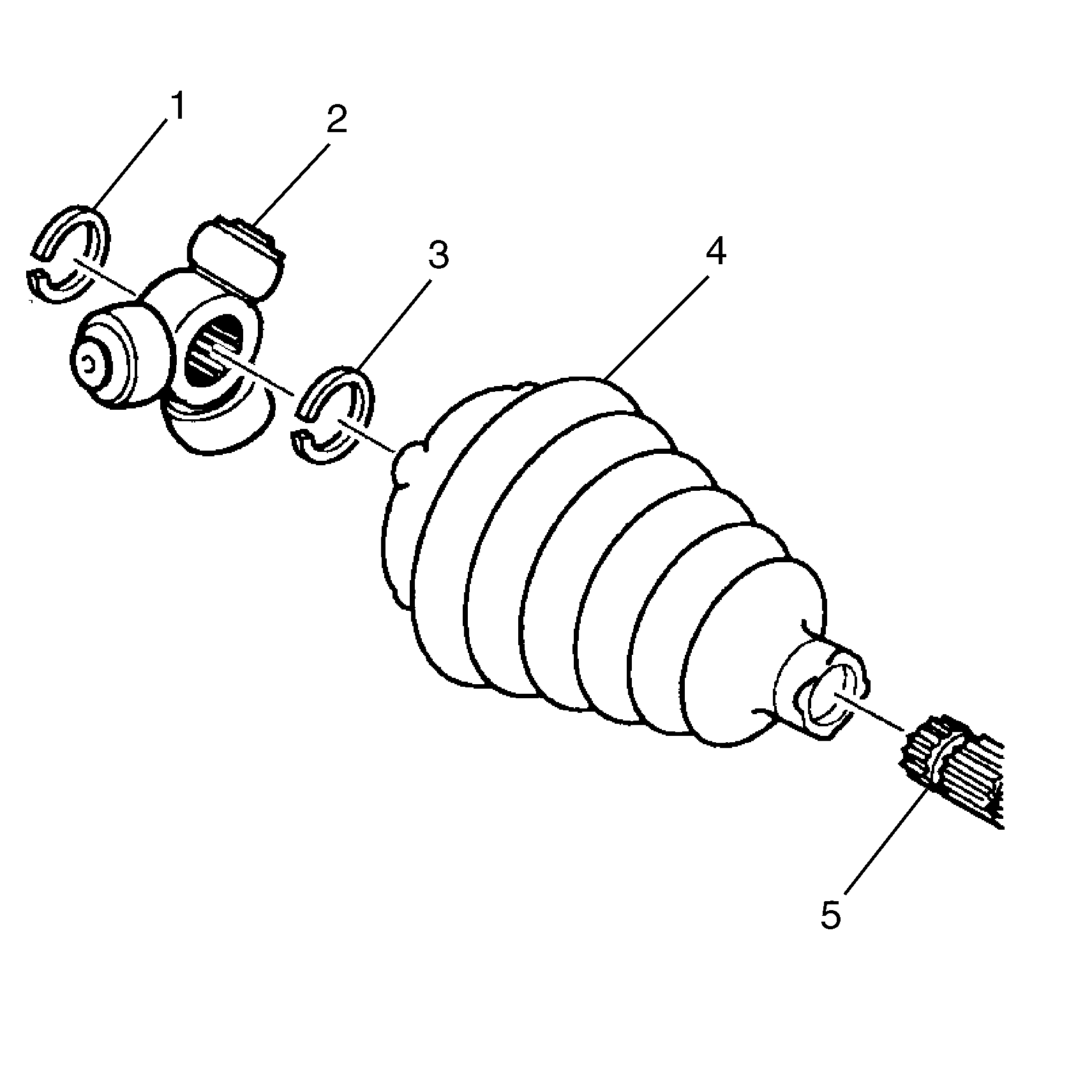
- Remove the spacer ring (1), spider assembly (2), spacer ring (3)
using
J 8059
, and tripot boot (4). Discard the boot and rings.
- Clean the shaft (5). Use a wire brush in order to remove any rust in the boot mounting area (grooves).
- Inspect the needle rollers, needle bearings, and trunnion. Check the tripot housing for unusual wear, cracks, or other damage. Replace any damaged parts with the appropriate kit.
Installation Procedure
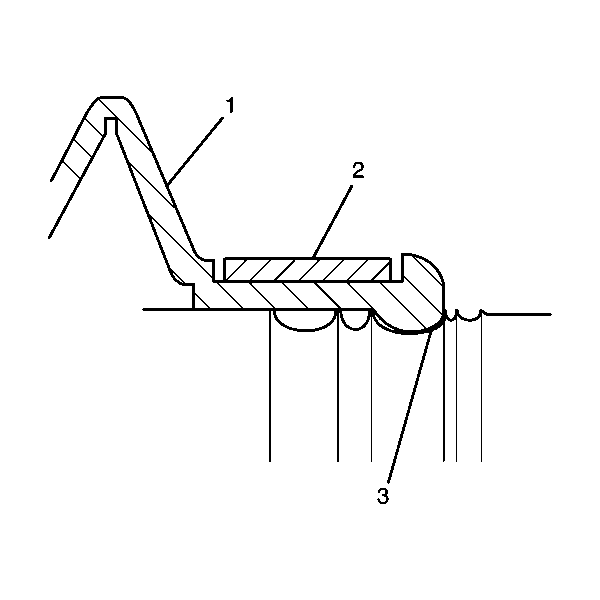
- Place the new small swage ring (2) onto the small end of the joint seal (1). Slide the joint
seal (1) and the small swage ring (2) onto the shaft.
- Position the small end of the joint seal (1) into the joint seal groove (3) on the shaft.
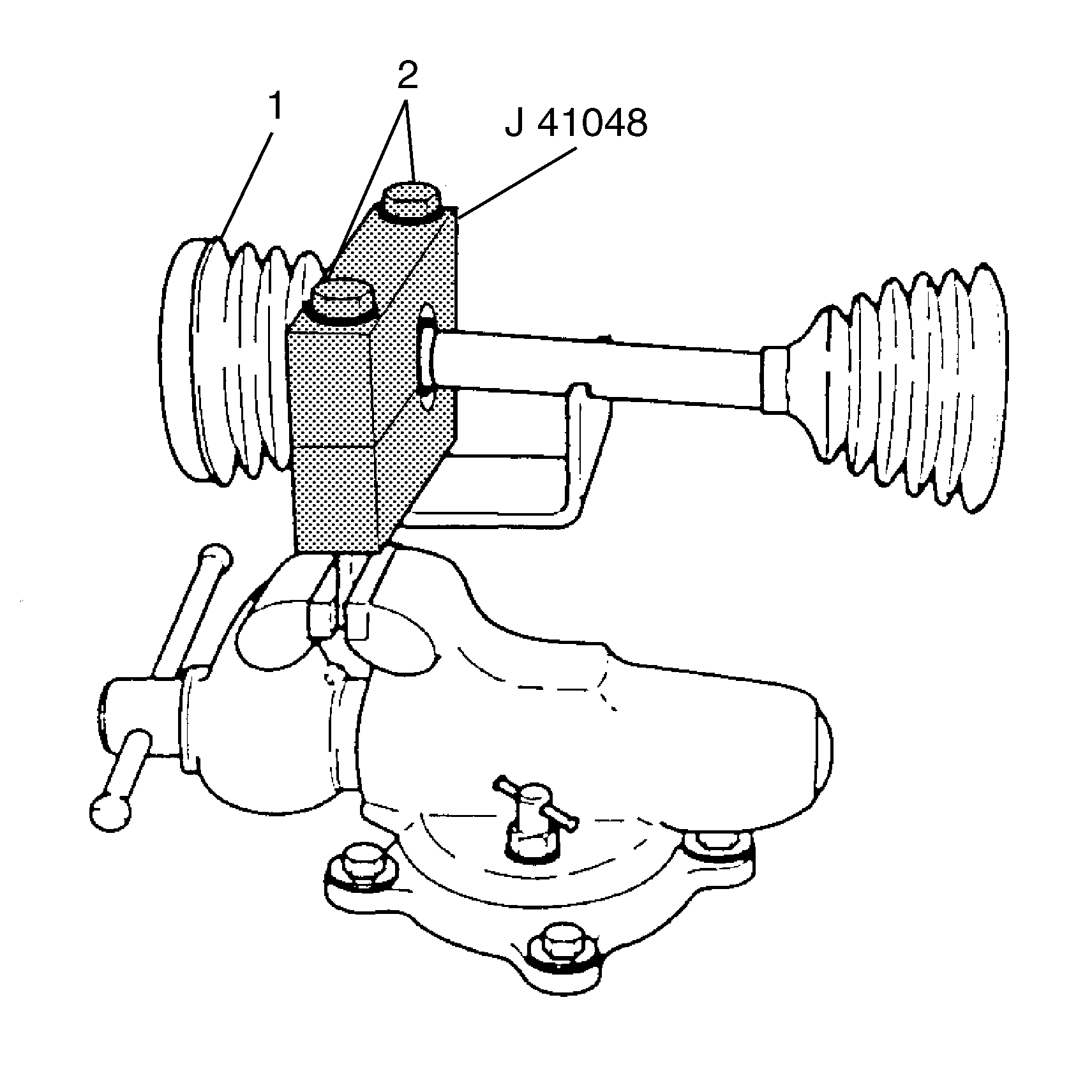
- Mount
J 41048
in a vise and proceed as follows:
| 3.1. | Position the inboard end (1) of the wheel drive shaft assembly in tool
J 41048
. |
| 3.2. | Align the top of seal neck on the bottom die using the indicator. |
| 3.3. | Place the top half of the
J 41048
on the lower half. |
| 3.4. | Before proceeding, ensure there are no pinch points on the wheel drive shaft inboard seal. This could cause damage to the inboard seal. |
| 3.5. | Insert the bolts (2). |
| 3.6. | Tighten the bolts by hand until snug. |
Notice: Refer to Fastener Notice in the Preface section.
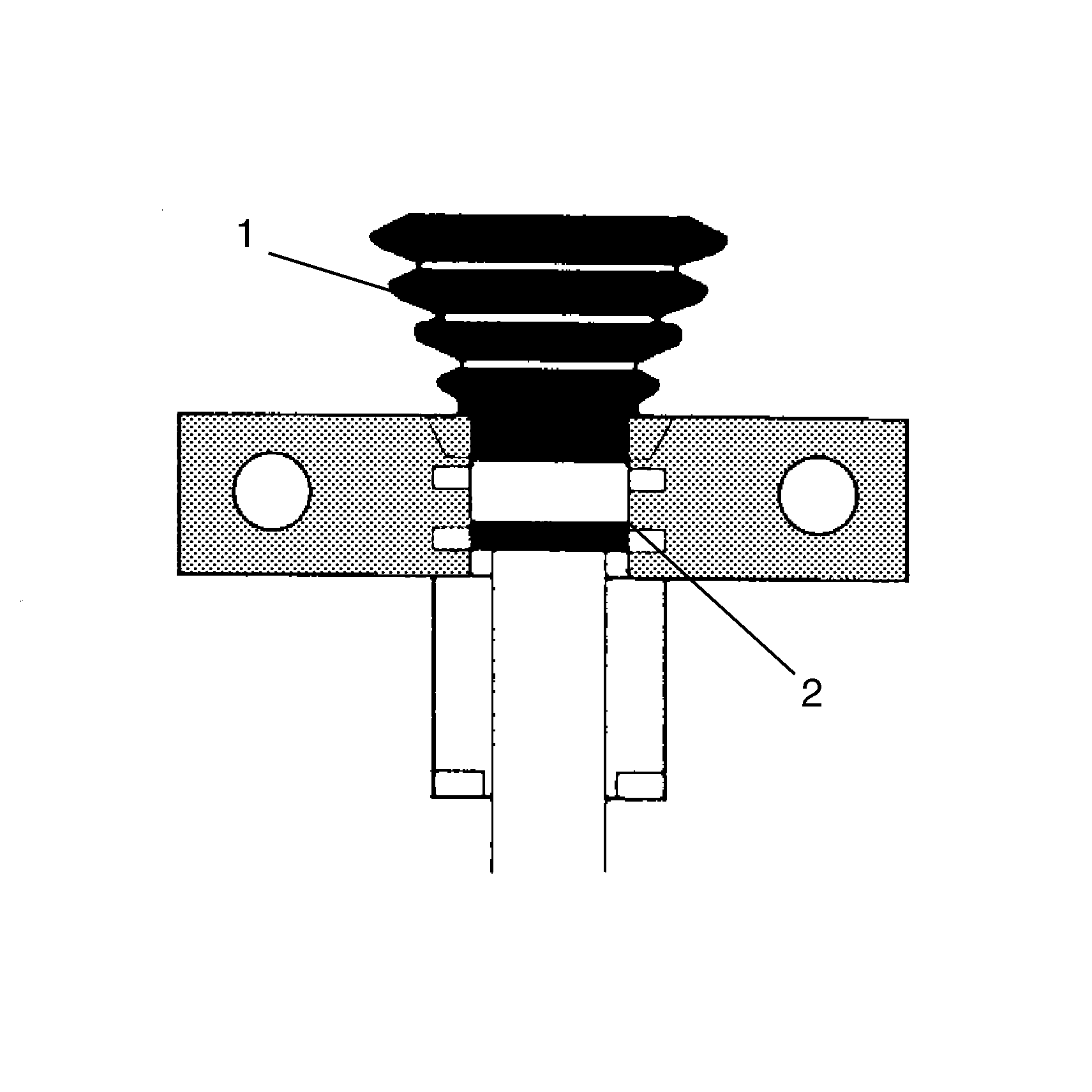
- Align the following items:
Tighten
Tighten each bolt of
J 41048
180 degrees at a time using a ratchet wrench. Alternate between each bolt until both sides are bottomed.
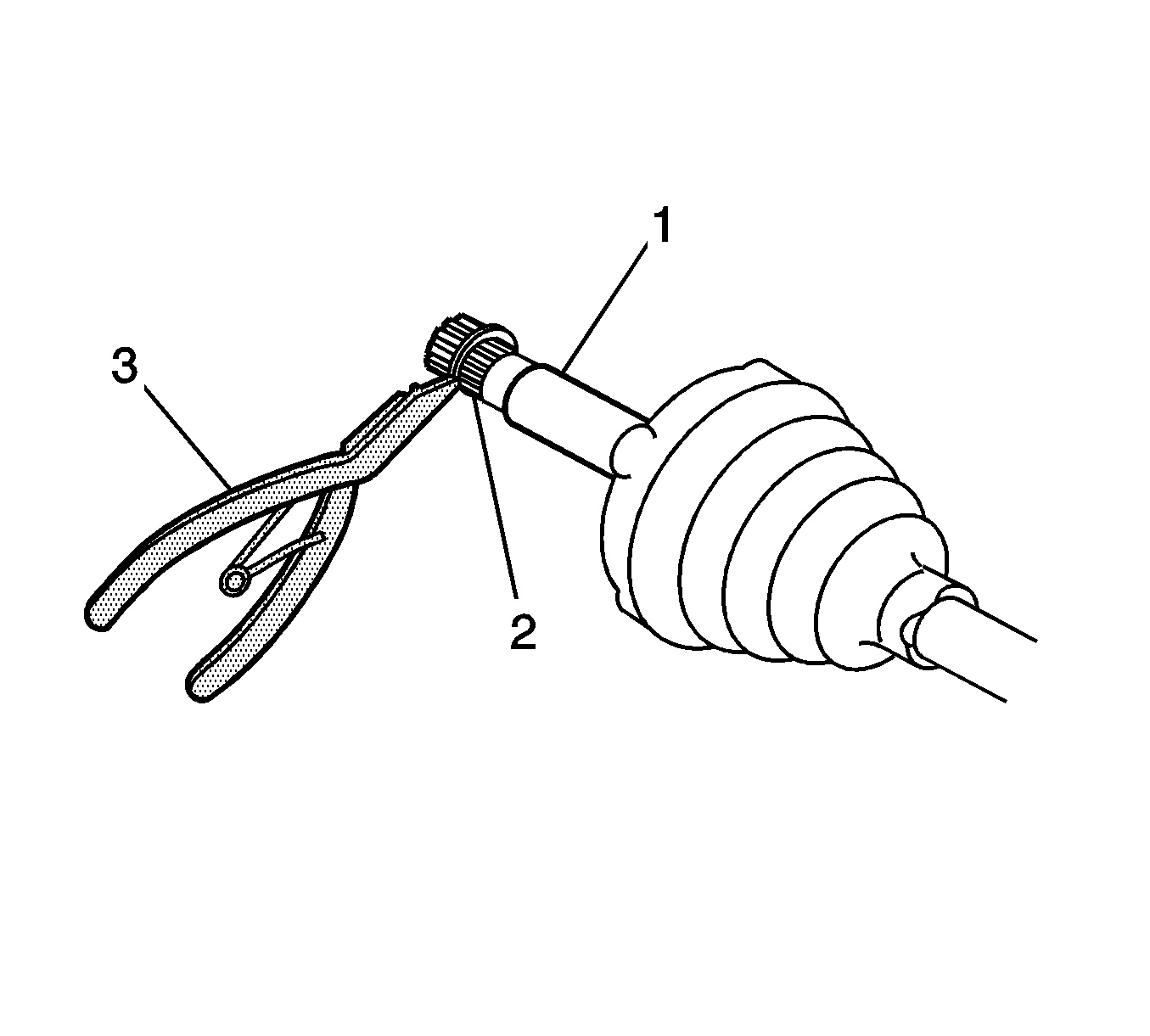
- Install the spacer ring (2) into the groove of the shaft using
J 8059
.
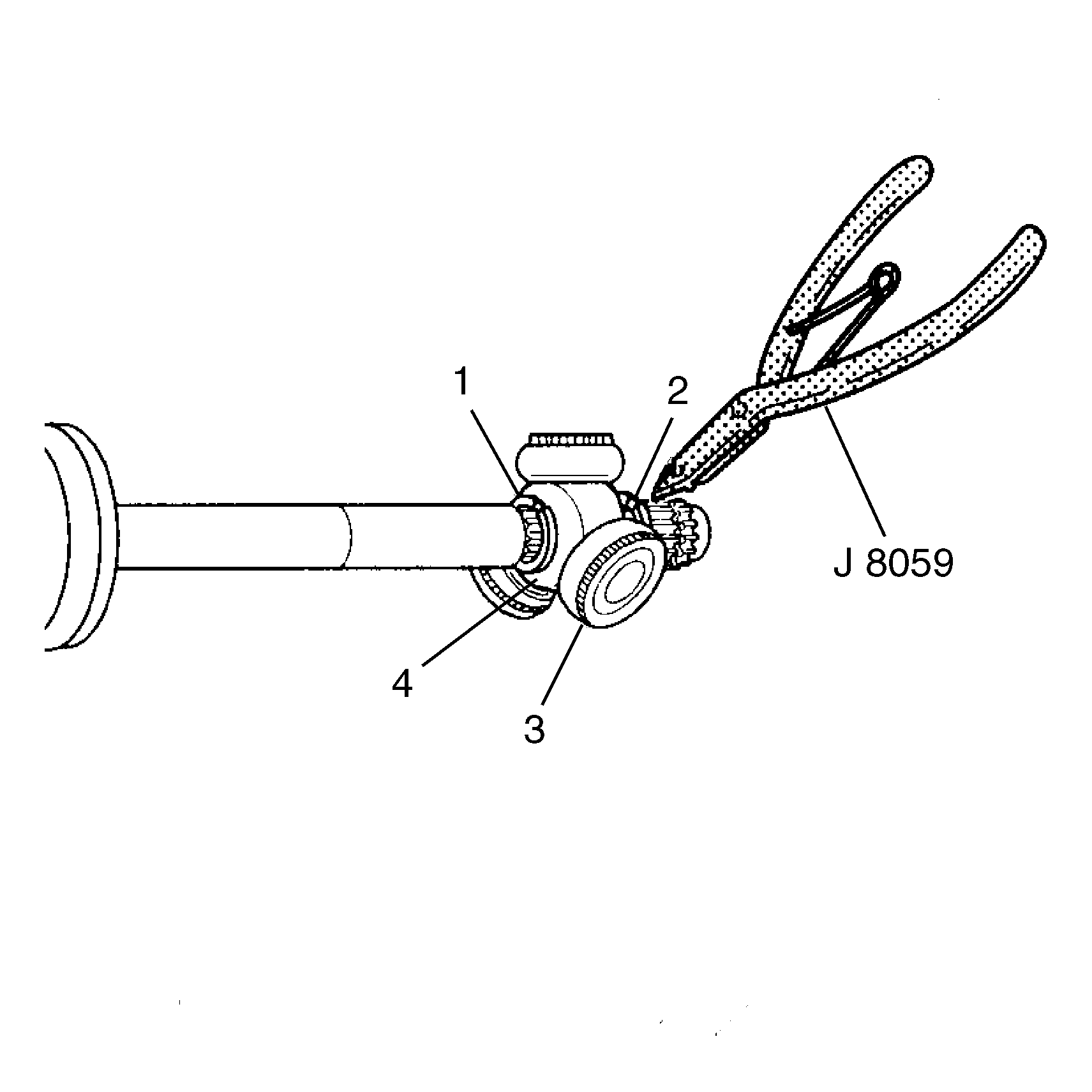
- Slide the tripot joint spider assembly (4) toward the spacer ring (1) as far as it will go on
the shaft.
- Install the spacer ring (2) into the groove of the shaft
J 8059
.
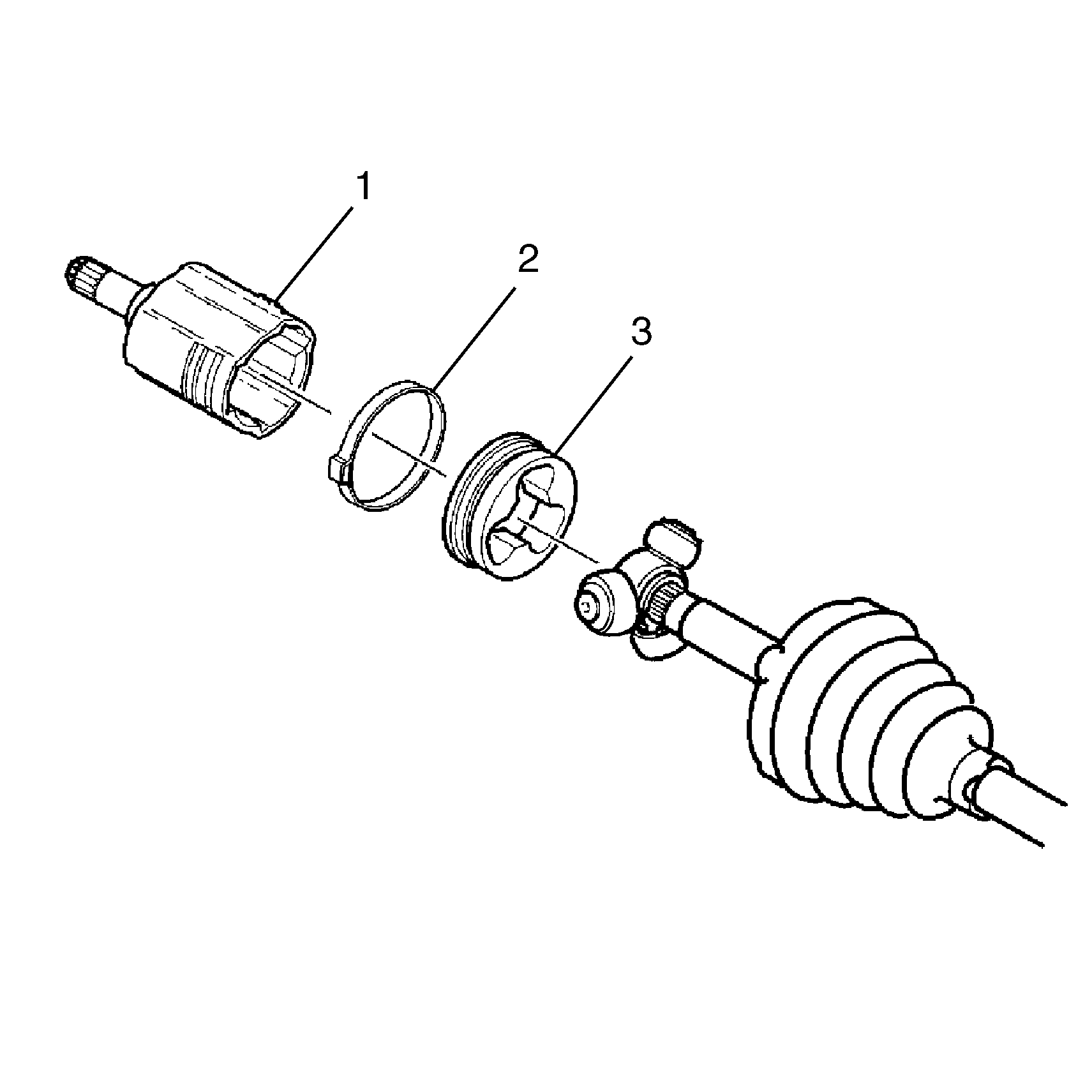
- Place approximately half of the grease from the service kit in the inboard seal. Use the remainder of the
grease to repack the housing.
Important: Ensure the trilobal tripot bushing (3) is flush with the face of the housing (1).
- Install the new trilobal tripot bushing (3) to housing (1).
- Position the larger new seal retaining clamp (2) on the inboard seal.
- Slide the housing (1) over the tripot joint spider assembly on the shaft.
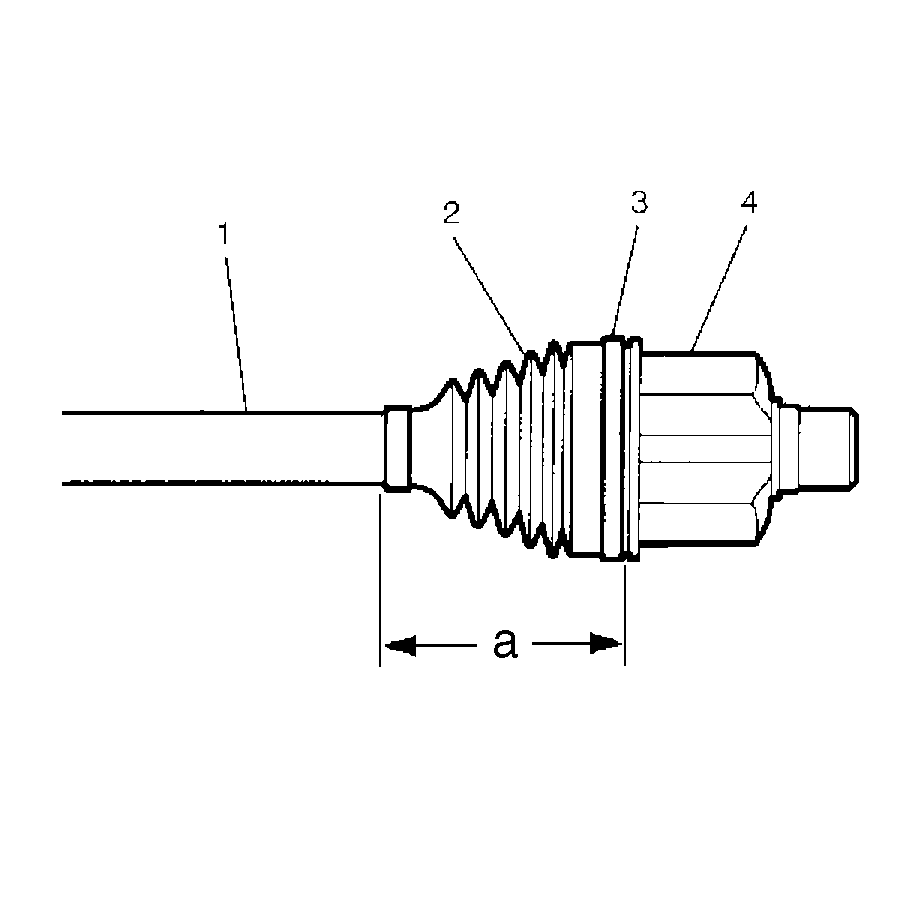
- Slide the large diameter of the inboard seal (2), with the larger clamp (3) in place, over the
outside of the trilobal tripot bushing and locate the lip of the seal in the groove.
Important: The inboard seal must not be dimpled, stretched out or out of shape in any way. If the inboard seal is not shaped correctly, carefully insert a thin flat blunt tool, no sharp edges, between the large seal opening and
the trilobal tripot bushing in order to equalize the pressure. Shape the inboard seal properly by hand. Remove the tool.
- Position the joint assembly at the proper vehicle dimension: 95 mm (3.75 in).
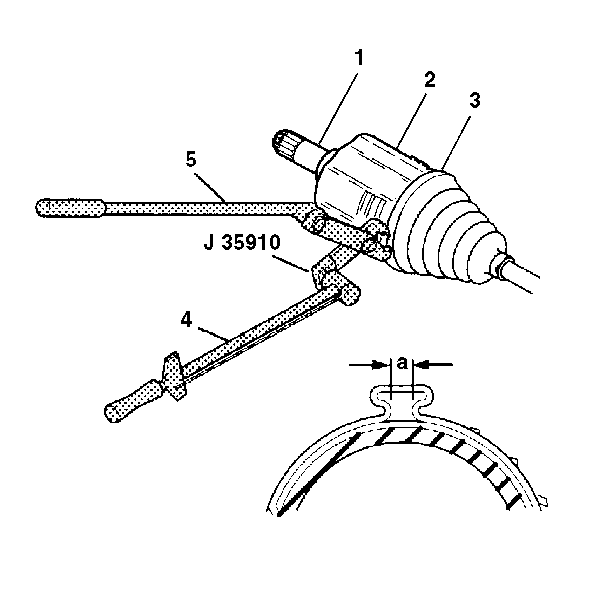
- Align the following items while latching:
| • | The large seal retaining clamp (3) |
Tighten
Crimp the seal retaining clamp with
J 35910
to 176 N·m (130 lb ft). Add the breaker bar (5) and the torque wrench (4) to
J 35910
if necessary.
- Check the gap dimension (a) on the clamp ear. If gap dimension is larger than shown, continue tightening until gap dimension of 2.60 mm (0.102 in) is reached.
- Fully stroke the joint several times to disperse the grease.
Wheel Drive Shaft Inner Joint and Boot Replacement Delphi
Tools Required
| • | J 35910
Drive Axle Seal Clamp Pliers |
Disassembly Procedure
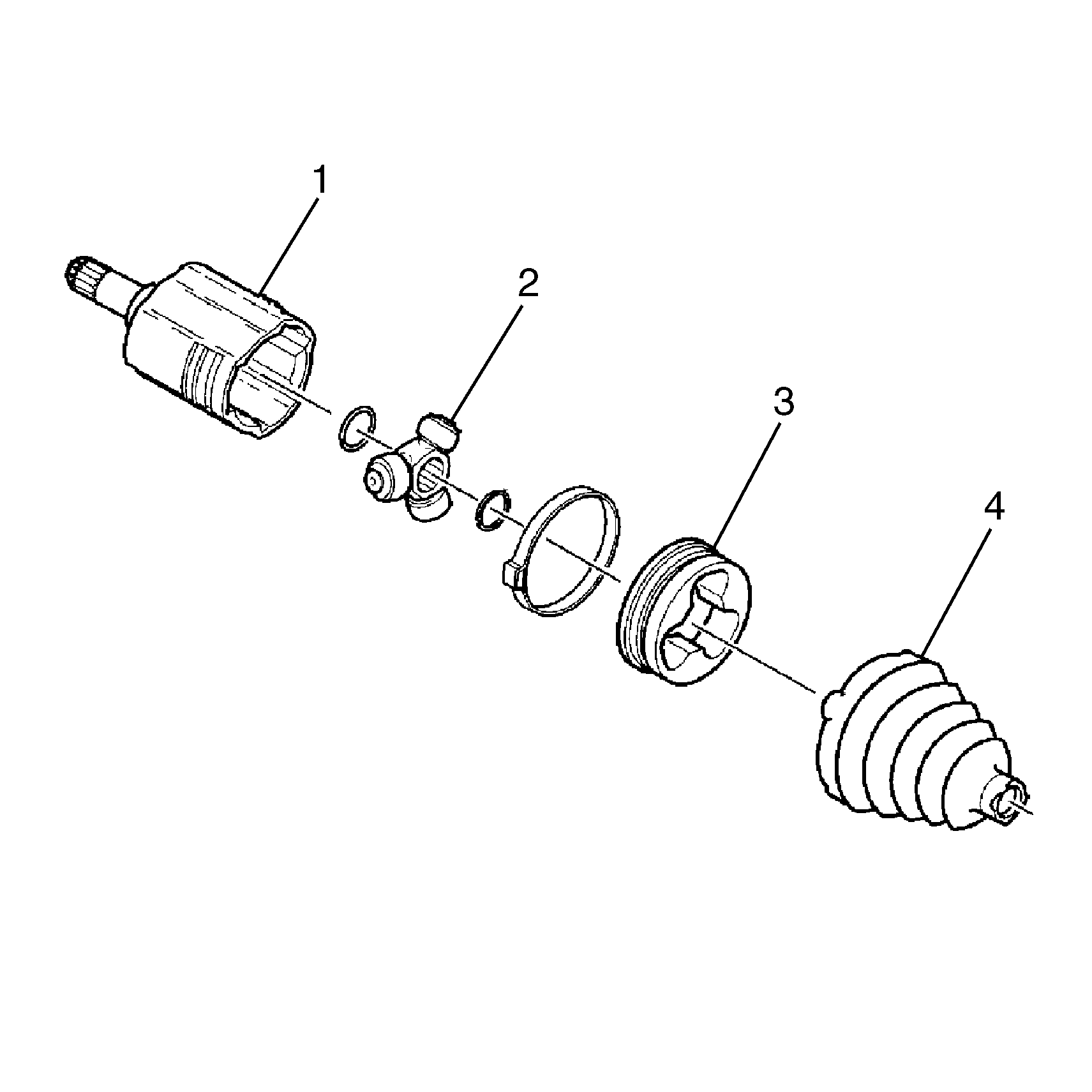
Important: With removal of the wheel driveshaft for any reason, the transmission sealing surface (the tripot male/female shank of the wheel driveshaft) should be inspected for corrosion. If corrosion is evident, the surface should
be cleaned with 320 grit cloth or equivalent in a rotation motion. Do not clean with an oscillating motion. Transmission fluid may be used to clean off any remaining debris. The surface should be wiped dry and the wheel driveshaft reinstalled free of
any buildup.
- Use a hand grinder in order to cut through the swage ring. Do not damage the tripot housing (1).
- Remove the large boot retaining clamp from the tripot joint with side cutter.
- Dispose of the large boot retaining clamp.
Notice: Do not cut through the wheel drive shaft inboard or outboard boot during service. Cutting through the boot may damage the sealing surface of the housing and the tripot or the constant velocity joint bushing. Damage
to the sealing surface may lead to water and dirt intrusion and premature wear of the constant velocity joint.
- Separate the wheel driveshaft inboard boot from the trilobal tripot bushing (3) at the large diameter.
- Slide the boot (4) away from the joint along the shaft.
- Remove the housing (1) from the tripot joint spider (2) and the shaft.
- Remove and discard the trilobal tripot bushing (3) from the housing (1).

- Remove and discard the lower spacer ring (1) from the groove (5)
on the shaft.
- Slide tripot joint spider assembly (2) off of the shaft.
- If present, remove and discard the second spacer ring (3) from the shaft.
- Clean the following items with cleaning solvent:
- Remove all traces of old grease and any contaminates. Dry all parts.

- Inspect the following parts for damage or wear:
| • | The tripot joint spider assembly (2) |
Assembly Procedure

- Place the new small boot clamp (2) onto the small end of the joint boot (1). Slide the joint
boot (1) and the small boot clamp (2) onto the shaft.
- Position the small end of the joint boot (1) into the joint boot groove (3) on the shaft.
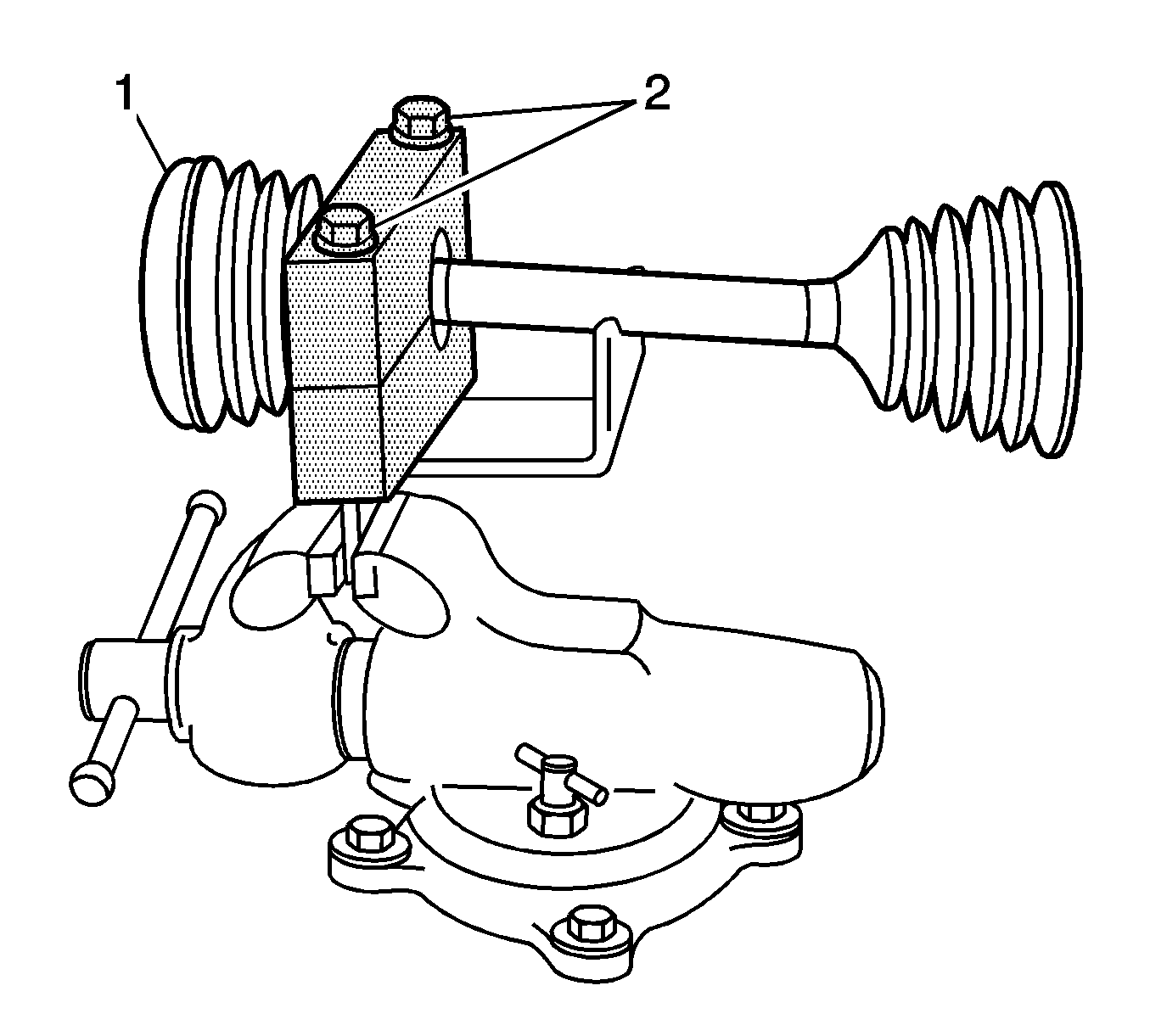
- Mount
DT-47732
in a vise and proceed as follows:
| 3.1. | Position the inboard end (1) of the wheel driveshaft assembly in tool
DT-47732
. |
| 3.2. | Align the top of boot neck on the bottom die using the indicator. |
| 3.3. | Place the top half of tool
DT-47732
on the lower half of tool. |
| 3.4. | Before proceeding, ensure there are no pinch points on the wheel driveshaft inboard boot. This could cause damage to the inboard boot. |
| 3.5. | Insert the bolts (2). |
| 3.6. | Tighten the bolts by hand until snug. |
Notice: Refer to Fastener Notice in the Preface section.

- Align the following items:
Tighten
Tighten each bolt of
DT-47732
180 degrees at a time using a ratchet wrench. Alternate between each bolt until both sides are bottomed.

- If equipped, install the spacer ring (2) on the shaft (1) in groove using
J 8059
.

- Slide the tripot joint spider assembly (3) toward the spacer ring (1) as far as it will go on
the shaft (4).
- Install the shaft retaining ring (2) in the groove of the shaft (4).

- Place approximately half of the grease from the service kit in the shaft inboard boot. Use the remainder of
the grease to repack the housing.
Important: Ensure the trilobal tripot bushing (3) is flush with the face of the housing (1).
- Install the trilobal tripot bushing (3) to housing.
- Position the larger new boot retaining clamp (2) on the shaft inboard boot.
- Slide the housing (1) over the tripot joint spider assembly on the shaft.

- Slide the large diameter of the inboard boot (2), with the larger clamp (3) in place, over the
outside of the trilobal tripot bushing and locate the lip of the boot in the groove.
- Position the joint assembly at dimension a = 107 mm (4.21 in).
- Carefully insert a thin flat blunt tool (no sharp edges) between the large boot opening and the trilobal tripot bushing in order to equalize the pressure. Remove the tool.

- Align the following items while latching:
| • | The large seal retaining clamp |
Tighten
Crimp the seal retaining clamp with
J 35910
to 176 N·m (130 lb ft). Add the breaker bar (5) and the torque wrench (4) to
J 35910
if necessary.
| • | Verify dimension a = 2.15 mm (0.085 in). |
- Fully stroke the joint several times to disperse the grease.






















